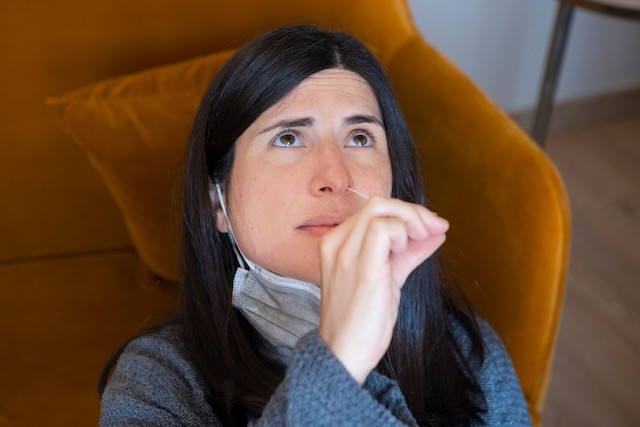Health minister Paulette Lenert (LSAP) during a press conference on Friday said the government has ordered 14.5m rapid antigen tests, which will be distributed across sectors, including healthcare, the public sector or organisations working with the homeless and other disadvantaged groups.
“It’s an additional safety,” said Lenert, adding that regular self-tests should become part of barrier gestures such as physical distancing, wearing masks or frequently washing hands.
People who are no longer working--jobseekers, pensioners or people supported by the social inclusion income (Revis)--will receive vouchers to pick up free self-tests at a pharmacy.
But Lenert warned that false negatives are more common than false positives and urged people who experience symptoms of a coronavirus infection or know that they were in contact with someone who tested positive not to rely on a negative self-test result. A proper PCR test should be sought out. Positive self-test results should also be registered with medical authorities, she said, to confirm the result by PCR test and carry out contact tracing.
More details are set to follow on how different sectors will adopt the tests, but rapid testing could become part of the solution to further open up cultural events and the gastronomy sector in what Lenert called “steps in direction of normality.”
Vaccines for 164,000 people by end of June
“The situation remains stable, looking at the last days and weeks,” prime minister Xavier Bettel (DP) said about daily new infections on Friday. “It’s too soon to make a definitive verdict on the last measures taken,” he said.
These included the reopening of terraces for outdoor dining and drinking. The government could announce further lifting of restrictions after its next cabinet meeting on 5 May, the premier said, provided that there is no exponential growth in infections.
“First results show that vaccinations allow us to take a step back to normality,” Bettel said. For the first time, fewer people over 65 are being admitted to hospital for treatment than those who are younger, the PM said.
If vaccine deliveries arrive according to schedule, another 164,000 people could be vaccinated by the end of June, Bettel said. Pfizer/Biontech has pledged 265,590 doses by end of June, with 40,800 expected by Moderna. The delivery schedule for AstraZeneca is only available for the first week of May, with 21,600 doses expected.
Luxembourg is about to launch the final phase of its inoculation strategy, offering the vaccine to anyone aged between 16 to 54, descending by age. There are around 354,000 residents in this age group.
Around 30,000 people so far have signed up to volunteer for the AstraZeneca jab. Among them is Bettel, who said he would be getting his first jab on 6 May.
Leftover waiting list opens
There is currently no schedule of deliveries for the Johnson & Johnson vaccine. The company had stopped shipment after US regulators had recommended halting the use of its formular over reports of blood clots as a rare side effect, similar to those observed with the AstraZeneca vaccine.
The European Medicines Agency said the vaccine should be used, not issuing any specific guidance on the age or gender of recipients. Luxembourg’s infectious diseases council (CSMI) said it should be used in anyone aged 30 or over and will therefore remain part of the standard repertory, Bettel said on Friday. It will not be added to the voluntary sign-up list.
A second waiting list, for people who wish to be alerted in case of leftover doses at one of the vaccination centres, opened for registrations on Friday. At the time of the press conference, Bettel said that 4,100 people had already signed up. But he also warned people not to get too excited.
“There aren’t thousands of leftovers in the evening,” Bettel said. “Out of more than 90,000 doses administered, fewer than ten weren’t used.”
The list is open until 8 May. People signing up must be able to reach a vaccination centre of their choice within 20 minutes between 6.30 to 7pm, Friday to Saturday. The leftover doses will be distributed by age, not on a first-come, first-served principle.
Additional test for India travellers
“The case of India shows us that this pandemic is real and what can happen from one day to the next,” Lenert said, announcing additional measures for incoming travellers.
People boarding a flight in India must show a negative test prior to departure. A second test is carried out upon arrival from a connecting flight in Luxembourg. Passengers must also quarantine and take another test six days into their stay. If this is negative, they quarantine is lifted after seven days.
“Our biggest concern is for the variants,” Lenert said. “We must stay vigilant. Things circulate. It’s about following meticulously how it moves here in the country.” First cases of the Indian variant had already been diagnosed in Luxembourg, Lenert said, adding that there were no indications so far of any infection chains linked to them.
Luxembourg will also be sending 58 respirators to India as part of the EU’s Civil Protection Mechanism, which coordinates aid from member states sent to the country.
